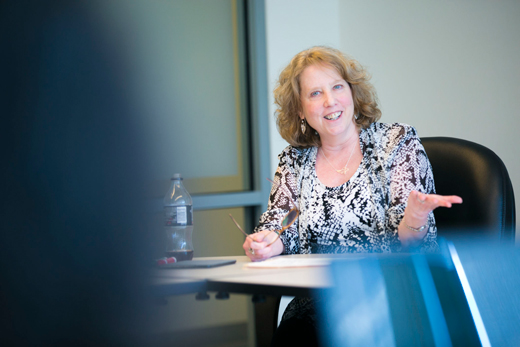Psychology professor Robyn Fivush is eager to talk about the future of the liberal arts at Emory — to envision it, scrutinize it and nurture a campus-wide dialogue about what it might look like 20 years from now.
In her new role as chair of the Commission on the Liberal Arts (CoLA), Fivush is leading a re-energized and expanded exploration of the liberal arts that was initiated early last year by former Provost Earl Lewis.
That examination continues this semester with the support of Provost Claire Sterk, who has previously served as a CoLA co-chair, building upon last year's work with new leadership and an enriched membership that includes the voices of faculty, staff and students, says Fivush, Samuel Candler Dobbs Professor of Psychology.
The charge: Take a broad, deep look at liberal arts education at Emory over the next quarter-century, an exercise intended to include all aspects of the liberal arts experience.
To formally launch the conversation this academic term, CoLA and the Office of the Provost will present "Fall Forum on the Liberal Arts" on Monday, Sept. 30 from 4 to 6 p.m. in the Cox Hall Ballroom, which will be moderated by Sterk.
Panelists will include:
James Wagner, University president
Wright Caughman, executive vice president for health affairs, Woodruff Health Sciences CEO and Emory Healthcare chair
Robin Forman, dean of Emory College of Arts and Sciences, Asa Griggs Candler Professor of Mathematics
Ajay Nair, senior vice president and dean of Campus Life
Laura Hardman, Emory trustee
"In putting together this inaugural conversation, it is our hope that the exchange between panelists and members of the audience will emphasize the importance of faculty, staff and student voices in the process of change," Fivush says.
Emory Report caught up with Fivush to discuss her new role and her vision for CoLA:
Why is this an important conversation to have right now?
Obviously the liberal arts have been under a lot of heated debate, both nationally and in the academy. Is college just about getting a job? What is it that a liberal arts research university offers? We don't want to sound defensive — that's actually a positive question.
Earl Lewis started the commission to undertake an important study: How do we envision Emory moving forward as a great liberal arts university? What is it that a residential liberal arts university offers in a changing environment around both higher education and the economy? Many people have already worked on this; we're making good use of that work.
What drew you to a leadership role around this topic?
When Provost Claire Sterk decided to reinvigorate the initiative, she asked me to step in; I was flattered and really happy to do it. I'd been working within the College on some interdisciplinary issues and was excited to get involved at the University level. I'm working with two vice chairs: Karen Stolley, a professor of Spanish, and Deborah Bruner, a professor in the School of Nursing. One of the reasons I particularly wanted someone from health sciences to be integrally involved in a leadership role was to make sure that this is a University initiative.
While the College is at the heart of this, the value of the liberal arts infuses everything we do across the campus, in our research and our scholarship. So this really is a University-wide initiative to examine how we can better facilitate flexibility for faculty and students to create structures and processes that allow us to do our work in more dynamic ways.
What's new about the work of CoLA this semester?
We have a somewhat different structure, working with an executive council, two vice-chairs and myself. While revisiting the original charge, we looked at the communication structure that existed, what we've accomplished, and decided it was a good time to step back and consider the objectives and how we want to achieve them. A summer planning panel representing the whole university met several times over the summer to consider the most effective way to move forward this year.
We developed a vision statement for the commission and created three new committees: Learning through Instruction; Learning through Innovation; and Learning through Integration. Learning is an umbrella term — the heart of what a university is all about, no matter where we are in our career. So we'll look at how we can best prepare students to learn, to solve complex problems through the application of knowledge, facilitating faculty to continue to learn through creation and discovery. We're very excited.
You've recently extended an invitation for staff participation on those committees.
That's because staff are critical to everything we do. We could not run as a university without them. And any recommendations we make — let's face it, who will implement them? The staff here are dedicated and thoughtful, and often see things faculty don't always see.
How will the committees work going forward?
We're trying to get wide representation, but we want them to be manageable, aiming toward 15 members. This semester, the committees will meet with a general mandate. The Executive Council will be working closely with them to look at questions and objectives. In the spring, there will be multiple opportunities for larger groups to give input.
We want to hear from everybody, in person or in forums or at town halls, a website, Twitter and Facebook. We're putting new information up on the website Liberal Arts Forward on a weekly basis to update people. We really think this will be successful only to the extent we can engage the whole community.
Our plan is to have a preliminary report to the provost by the end of next summer.

